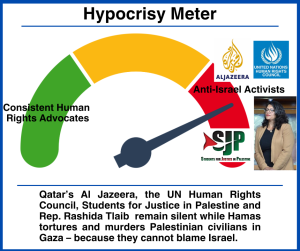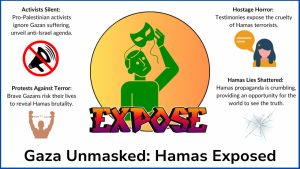
![]()
BACKGROUND – TALKING POINTS – ACTIONS – STORIES
![]()

Palestinians Risk Their Lives to Protest Hamas
Hamas terrorists dumped the body of 22-year-old Palestinian Odai Naser Saadi on the doorsteps of his family’s home with a chilling message: “This is the price for those who criticize Hamas.” Odai was tortured for four hours and “dragged by a rope around his neck, beaten with clubs and metal rods in front of passersby.” He was one of the growing number of Palestinians against Hamas rule in Gaza.
Gazans started protesting in the streets against their government on March 25. Thousands of Palestinians marched in northern Gaza the next day. Hamas terrorists killed six Palestinians for speaking out and more were reported missing. Gaza social activist Hamza al-Masri lost an eye to Hamas torturers in the past: “Just for asking to live, a Hamas military unit kidnapped several young men.”
Palestinian Protests Are Not New: ‘Tyranny must end’
Iran-backed Hamas has brutally ruled Gaza since 2007, when it assumed control of the elected government. Since then, the terror group has engaged in violence against its own citizens to maintain power and divert humanitarian aid to build its military. Saudi journalist Rashed Al-Qahtani: “The people of Gaza have been complaining of oppression and violence by Hamas since its inception and takeover of Gaza. The violence Hamas directs at the Palestinian people is despicable, horrifying and recurring. Hamas violence is a crime against humanity.”
Thousands of Palestinians participated in 2019’s ‘We Want to Live’ demonstrations against Hamas. The Center for Peace Communications released its Whispered in Gaza documentary series featuring the testimonies of Palestinians oppressed by Hamas. One of the protest leaders, Moumen Al-Natour, recently penned an op-ed in the Washington Post: “Why I and thousands of my fellow Gazans say Hamas tyranny must end.”
Moumen: “We are protesting against the group that has dictated every aspect of our lives for 18 years. Our message is clear: The people of Gaza want to live – so Hamas must go, the hostages released, and this war must finally end. Some in the West will be confused to see Palestinians openly calling Hamas terrorists – after 18 months of many protesters in Western cities openly supporting Hamas. To support Hamas is to be for Palestinian death, not Palestinian freedom. Hamas is killing us – through war, poverty and extortion – not liberating us.”
The Palestinian civil rights leader also described how Hamas in its current war against Israel often places its fighters and rocket launchers in civilian neighborhoods and humanitarian zones and steals humanitarian aid. He was tortured multiple times during the 2019 protests. He called on those who advocate for Palestinians to voice their support now – because Palestinians fear that they will never be free from Hamas.

American and International Activists: Pro-Palestinian or Anti-Israel?
U.S. Rep. Rashida Tlaib typically tweets multiple times per day about events in Gaza but has not once acknowledged the protests against Hamas. Campus activists and influencers who consistently condemn Israel – including for killing Hamas terrorists – are hypocritically silent when Hamas kills its own civilians.
Palestinian-American human rights activist Ahmed Fouad Alkhatib – who lived in Gaza as a child – called out the hypocrisy: “Shame on all who failed the protesters in Gaza and ignored their pleas and cries for freedom, dignity and a future free of Hamas, terrorism, violence and conflict. Shame on all the ‘journalists,’ ‘human rights’ fraudsters, ‘pro-Palestine’ and ‘solidarity’ activists, college campus advocates, academics, clueless leftists, conspiracy theorists, Intifadists, Jihadists, professors and other imbeciles who did not utter a word in support of tens of thousands of Gazans demanding an end to Hamas and the war that it started. Your beloved ‘resistance’ group just tortured 22-year-old Oday to death and left his body out in the street.”
Positive Press for Hamas: Propaganda Amplified and Protests Ignored
Hamas leaders falsely claimed that the six protesters they killed for speaking up against their rule were executed because they ‘collaborated’ with Israel. This is the term used by Palestinian terror groups to justify the killing of their own civilians. Hamas also stated that the protests were against Israel. These lies were repeated by many so-called pro-Palestinian activists.
News organizations aligned with Hamas parroted its talking points. Qatar’s Al Jazeera falsely described the anti-war protests as being against Israel instead of Hamas. Palestinian peace advocate Hamza Howidy explained that Hamas used its “propaganda machines” – including Al Jazeera, human rights organizations and ‘pro-Palestinian’ activists – to amplify the terror group’s false narrative. Al-Jazeera’s English-language media outlet, AJ+, posts massive amounts of anti-Israel content on its X page, but conveniently ignored the protests.

Many reporters and news organizations that unquestionably publish Hamas-fabricated lies and manipulate statistics provided little coverage of the Gaza unrest. Amjad Taha, an author and analyst from the UAE, called out Al-Jazeera and Britain’s BBC for failing to air footage 14 hours after the protests began: “They refused because it shows Gazans furious at Hamas terrorists using their hospitals as shields, chanting loud and clear: ‘Hamas are terrorists.’”
Major American news channels often rely on the AP and Reuters to provide content from Gaza. The same Gaza journalists who entered Israel with Hamas terrorists on Oct. 7 to document the massacres and recorded footage at the grotesque hostage release ceremonies were suddenly absent from the protests against Hamas. Some media giants focused on anti-Israel stories instead.
New Hostage Testimonies: ‘You will get a new wife and kids’
April 7 will mark 18 months in captivity for the remaining 59 hostages – 24 presumed to be living, including one American. This group includes Evyatar David and Guy Gilboa-Dalal who are being chained, starved and kept in complete darkness. Other hostages continue to suffer from physical and psychological torture.
Mexican-Israeli Ilana Gritzewsky recently told The NY Times that she was sexually assaulted by Hamas terrorists. Ilana described being groped and passing out while being driven into Gaza. She awoke with seven terrorists standing over her naked body. Media organization Fuente Latina will be releasing a 10/7 documentary on Latino-Israeli voices – the largest immigrant group targeted by Hamas.
The CBS newsmagazine 60 Minutes aired interviews with recently released hostages, including Yarden Bibas. His wife and their two young red-headed children were “were murdered in cold blood – bare hands.” Yarden’s Hamas captors told him: “‘Oh, it doesn’t matter. You get a new wife, new kids. Better wife, better kids.’ They said that many times.”
Tal Shoham was held captive with Guy Gilboa-Dalal – still in a Hamas dungeon. Guy cried for five straight days after being captured. The hostages were given very small amounts of pita, rice and water: “Sometimes the water tastes like blood, sometimes like iron. Sometimes it was so salty that you could not drink it, but you don’t have anything else.” Some hostages discussed committing suicide.
Released hostages have become vocal advocates for securing the release of the remaining hostages. Ilana Gritzewsky: “If I am out, it’s a sign that G-d wanted me to raise my voice to help those who are alive gain their freedom and bring back the dead for a proper burial.”
Fact Checking: 60 Minutes Promotes False Hamas Narrative
While the overall 60 Minutes segment was a powerful indictment of Hamas cruelty, journalist Lesley Stahl reported that an estimated 50,000 Palestinians died in the Gaza war – without attributing the casualty number to the Hamas-run Gaza Health Ministry. The CBS news magazine is hardly alone. Many journalists regularly repeat the false Hamas narrative. Researchers analyzed recently published Hamas fatality data that calls into question many of the conclusions echoed in the news and on social media also do not delineate between Hamas terrorists and civilians.
The CBS reporter asked American-Israeli former hostage Keith Siegel to describe how little food the captives were given. Eli Sharabi lost 40% of his body weight. Stahl asked: “Were they giving you less food, or did they just not have enough to give?” Siegel responded that the kidnappers had no shortage of food – eating in front of them at the same time.
Tal Shoham recalled that the terrorists told them that they calculated the minimum amount of food that the hostages would need to survive for years. He was told: “You won’t die, but you will have the worst time.” Stahl blamed the ceasefire collapse on Israel without citing Hamas violations, including when Hamas released the wrong body of Shiri Bibas.

![]()

![]()

Amplify the voices of truth: Share the facts presented in this edition with your family, friends and online communities. Use the accounts of Palestinian bravery and Israeli hostage suffering to counter the false narratives perpetuated by Hamas and its supporters. Encourage informed dialogue and challenge those who remain silent. Conversations are an opportunity to educate and inform.
![]()


Stories Impacting American Jews
Stories Impacting the U.S. and Israel
Stories From Around the World
![]()
In light of the surge of current relevant news, please subscribe to our Daily News Brief, a digest of critical news headlines curated from thousands of media addressing issues that affect the Jewish world.
![]()

This content is developed by The Focus Project in partnership with MERCAZ USA. The Focus Project distributes weekly news and talking points on timely issues concerning Israel and the Jewish people, including antisemitism, anti-Zionism and the delegitimization of Israel. It represents a consensus view across a spectrum of major American Jewish organizations. MERCAZ USA recognizes and respects the diversity of views on these issues among its readers and the community at large.
![]()